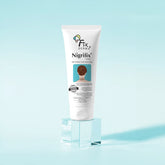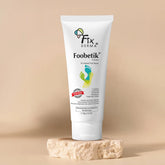Is a Serum Necessary in a Skincare Routine?

Table of Content
- Do You Need a Serum in Your Skincare Routine? A Complete Guide
-
What Is a Serum?
- Benefits of Serum
-
Do Serums Play a Vital Role in Your Skincare Routine?
- How to Use Serum in Daily Skincare
- Choosing the Right Serum for Your Skin Type and Concerns
- Serums and Moisturizers: What Sets Them Apart?
- Top Picks for the Best Serums in Your Daily Skincare Routine
- Conclusion
- Frequently Asked Questions (FAQ’s)
💧 Serums are like your skin's VIP treatment! While they're not essential for everyone, they provide a concentrated boost of ingredients that can target specific concerns like fine lines, dryness, or dullness. Think of them as the secret sauce that makes your skincare routine extra effective! 🌟
Do You Need a Serum in Your Skincare Routine? A Complete Guide
When it comes to skincare there is no limitation or shortage of skin products and one of the most talked about items in recent times has been the serum. Is serum necessary in a skincare routine? Do you require it for your face? So the answer to all your questions is it depends or varies from person to person.
So in this blog, we will look into various benefits of using serum in skincare, how it can be incorporated in daily routine, and which serum targets the skin concern. So by the end of this blog, you will get all the required knowledge concerning serum and determine which serum is right for your skin.
What Is a Serum?
A serum is a very lightweight and highly concentrated skincare product that especially has some active ingredients that directly go into the skin. Unlike moisturizers which usually hydrate and lock the moisture into the skin, serum contains higher concentration and targets some specific skin conditions such as pigmentation, wrinkles, acne, or dryness. Serums are usually applied after cleansing and toning but before moisturizing, and because of their thin texture they absorb very well within the skin.

Benefits of Using Serum in Skincare
Before deciding whether to include serum in your routine it is crucial to understand the benefits that it offers:
-
Targeted Treatment: Serums are usually packed with concentrated active ingredients like Vitamin C, hyaluronic acid, peptides, or retinol. These ingredients target specific skin concerns like dullness, acne, fine lines, and hyperpigmentation.
-
Enhance and Improve the Skin Texture: Regular use of the right serum can for sure improve your skin’s texture. Some ingredients like vitamin C may help to even the skin tone whereas retinoids help in cell turnover and make the skin smoother.
-
Boost Hydration: While moisturizer locks the moisture into the skin, hydrating serums for dry skin offer an added boost of hydration. Many hydrating serums are been formulated with humectants like hyaluronic acid attracts moisture to the skin and makes it plump and dewy.
-
Anti-Aging: Generally anti-aging serums consist of ingredients like retinol, peptides, or antioxidants, that help to reduce the appearance of fine lines, wrinkles, and age spots. Mainly these serums encourage collagen production and cellular renewal and help your skin look youthful and radiant.
-
Brightens the Skin: Vitamin C serums are been used for brightening and they are quite popular products as well they can reduce dark spots, and enhance skin radiance.

Do Serums Play a Vital Role in Your Skincare Routine?
Incorporating a good serum into your skincare routine is very simple but the order in which you apply these products is quite essential for better and enhanced results. So let’s look at some ways you can incorporate serum in your daily skincare routine.
-
Cleanse your Skin First: Start preparing your skin with a gentle cleanser that suits your skin type to remove all the dirt, oil excess oil, and makeup. Cleansing prepares your skin to absorb all the active ingredients in your serum.
Recommended Product:
Fixderma Skarfix-TX. This powerful face cleanser effectively diminishes the appearance of Melasma, PIE, PIH, and Hyperpigmentation. The power of Tranexamic Acid which inhibits melanin transfer with great efficacy and synergistic effect by Kojic acid, Alpha Arbutin, and Phytic Acid. This non-drying cleanser reveals smoother, evenly toned skin with every application.
-
Apply Serum: Take a small amount of serum and gently press it into your skin. Pay more focus on areas that require more attention such as fine lines, pigmentation, or dryness. Be sure to pat the serum into your skin by simply rubbing as this helps for better absorption.
Recommended Product:
Fixderma Collagen Booster Face Serum. It is a powerful anti-aging solution to fight signs of aging by revealing youthful skin. Formulated with hydrolyzed collagen and peptides, it effectively reduces wrinkles and fine lines by regulating collagen production. This moisturizing serum enhances skin firmness, smoothness, and plumpness. Suitable for daily use, it delivers long-lasting hydration and visible results.
-
Moisturize: Do a proper follow-up with a good moisturizer to lock and seal all the benefits of the serum and keep your skin hydrated.
Recommended Product:
Fixderma Durave Acne Control and Oil Free Face Moisturizer. This multitasking product tackles breakouts, controls oil production, and nourishes the skin – all in one! Glycolic Acid gently exfoliates dead skin cells, promoting a smoother texture and improving overall skin tone for visibly brighter skin.
-
Sunscreen: If you are using a serum that has active ingredients like vitamin C or retinol, then apply sunscreen in the morning. Sunscreen is very crucial as it protects you from UV damage.
Recommended Product:
Fixderma Shadow SPF 30+ Gel. The lightweight and non-greasy formulation is packed with both physical and chemical sun protectors which makes it perfect for all skin types. This oil-free formulation provides long-lasting broad-spectrum UV protection and leaves no white cast.

Choosing the Right Serum for Your Skin Type and Concerns
Different skin types need different formulations. So whether you have oily skin, dry, sensitive, or combination skin, there is a serum for you.
-
Hydrating Serum for Dry Skin: If your skin looks tight or flaky a hydrating serum can help you to retain the moisture and also improve the skin texture. Consider a serum that comprises hyaluronic acid or glycerin as these ingredients can attract water to the skin and maintain the level of hydration.
-
Lightweight Serums for Oily Skin: For those who have oily skin choose a lightweight serum that hydrates without clogging any pores. Gel-based serums or the ones that contain niacinamide are excellent options as they regulate the oil production by soothing the inflammation.
-
Vitamin C Serum for Brightening: If you are in the quest to brighten your skin or reduce or minimize pigmentation, vitamin C serums for brightening are an excellent choice. These help reduce the appearance of dark spots promote collagen production and enhance the overall radiance of the skin.

Serums and Moisturizers: What Sets Them Apart?
Some have confusion in understanding the difference between serums and moisturizers. Both are quite essential in skincare routine as they serve different purposes.
-
Serums: These are highly concentrated formulas that address specific skin concerns such as dark spots, or wrinkles. These are usually lighter and thinner in comparison to moisturizers and they contain high levels of active ingredients.
-
Moisturizers: The role of moisturizers is to hydrate and lock the moisture into the skin. They are thicker and also form a barrier to prevent water loss.
While serums target some specific issues, on the other hand, moisturizers offer a protective layer and keep the skin hydrated and smooth.

Top Picks for the Best Serums in Your Daily Skincare Routine
When choosing or selecting a serum for daily use, it is very important to ensure that the serum matches your skin's needs. Some of the popular serums are as follows:
-
Affordable Serums for Glowing Skin: If you are on a budget then look for serums that are under 1000 bugs and ensure it focuses more on the hydration and brightening of the skin.
-
Best Serums for Indian Skin: In a country like India lightweight serums are perfect as they contain ingredients like vitamin C, or niacinamide which are great choices for glowing skin.
-
Natural ingredients in Serums: If you prefer natural products then look for serums that consist of ingredients like aloe vera, green tea, and vitamin E to nourish and hydrate your skin naturally.
Conclusion
Incorporating a serum into your skincare routine can have a transformative effect on your skin, but whether it’s necessary depends on your skin’s unique needs. If you’re dealing with specific concerns like acne, pigmentation, or fine lines, serums can provide targeted solutions. Serums for glowing skin, anti-aging serums, and hydrating serums offer powerful benefits that moisturizers alone may not be able to provide. The key is to choose the right serum for your skin type and concerns and layer it properly for maximum results.
Serums are not a one-size-fits-all solution. Consider your skin’s specific needs, and always choose products that align with your goals. Whether you’re looking for serums for acne-prone skin, or seeking out the best way to incorporate a serum into your skincare, the right serum can make all the difference in achieving the glowing, healthy skin you’ve always desired.
Frequently Asked Questions (FAQ’s)
-
What is a face serum, and what does it do?
A face serum is a lightweight skincare product packed with high concentrations of active ingredients like vitamins, antioxidants, or peptides. It penetrates deeper into the skin than moisturizers, targeting specific concerns such as wrinkles, pigmentation, or acne. Serums work as problem-solvers, enhancing your skin's texture, tone, and overall health.
-
Do I need a serum if I already use a moisturizer?
Not necessarily. Moisturizers provide hydration and form a protective barrier on your skin, while serums are designed for deeper, targeted action. If you have specific concerns like fine lines, dark spots, or dullness, adding a serum can enhance your skincare routine. However, for basic hydration, a moisturizer might suffice.
-
Can a serum replace other skincare products?
No, serums are not replacements but complements to other products. They deliver active ingredients but lack the emollients that seal in moisture, which moisturizers provide. Similarly, they don’t offer the sun protection of an SPF. Each product plays a unique role in a complete skincare routine.








